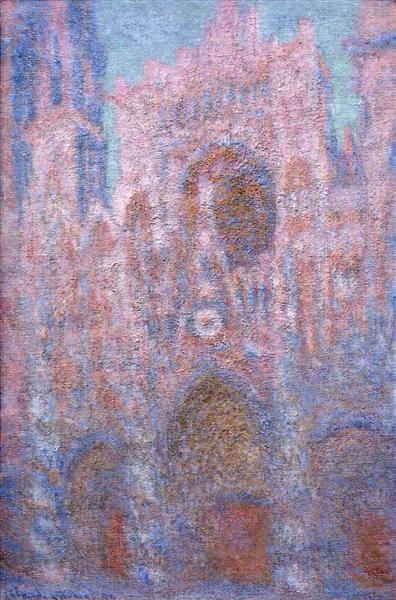Kuvaus
The work "Rouen Cathedral - Symphony in Grey and Pink", painted by Claude Monet in 1894, represents one of the culminations of his series dedicated to the famous Gothic cathedral in the Norman city of Rouen. Monet, a pioneer of the Impressionist movement, used this cathedral as a recurring theme in his work, exploring how light and color interact in the perception of the building at different times of the day and in various atmospheric conditions. This particular work is a notable example of his interest in capturing the ephemeral essence of light and atmosphere.
In Symphony in Grey and Pink, Monet adopts a subtle colour palette in which shades of grey and pink predominate, creating a delicate, almost dreamlike atmosphere. The cathedral, with its imposing façade and elaborate architectural details, is presented in a state of transition. Monet seems to focus on the variations of light that illuminate the cathedral's stone, transforming its colour and shape through reflections and shadows. This fragmentation of the image aligns with his interest in movement and perception, fundamental characteristics of Impressionism.
The composition of the painting is notable for its elegance and simplicity. The cathedral occupies the central plane, while the splashes of color at the bottom add a sense of ground and depth. Monet employs a loose and expressive brushstroke, which often occupies the top and edges, suggesting the changing atmosphere surrounding the building. There are no human figures in this work, which gives a solitary and contemplative character to the cathedral, as if the viewer were invited to immerse himself in the stillness of this monument under a constantly changing sky.
This canvas is part of a larger series in which Monet captured Rouen Cathedral at different times and under different lighting conditions. In each of these works, a similar approach can be perceived: an immersion in the effects of light on the architectural surface, highlighting the atmosphere rather than the minute details. The cathedral, emblematic of the city, becomes a symbol of the interrelationship between art, light and the passage of time.
Monet's technique, characterized by his bold use of color and light, marked a radical shift in the art of his time, challenging the conventions of academic realism. His work inspired generations of artists who, like him, sought more subjective and emotional representations of the world. "Rouen Cathedral - Symphony in Grey and Pink" not only captures a specific moment, but stands as a standard-bearer for a movement that valued visual experience and personal perception over a pre-established set of rules.
In the broader context of his contemporaries, this work can be placed alongside other Impressionist masters who also explored similar themes. However, Monet's sincere exploration of light and his almost spiritual approach to the cathedral give him a unique place in art history.
As one contemplates Symphony in Grey and Pink, it is impossible not to be enveloped by the sublime interplay of color, light and form. Monet does not simply portray the cathedral, but delves into the intangible, inviting the viewer to reflect on what it means to perceive architecture and nature, revealing the power of light as a transformative element.
KUADROS ©, a famous painting on your wall.
Hand-made oil painting reproductions, with the quality of professional artists and the distinctive seal of KUADROS ©.
Painting reproduction service with satisfaction guarantee. If you are not completely satisfied with the replica of your painting, we will refund 100% of your money.

